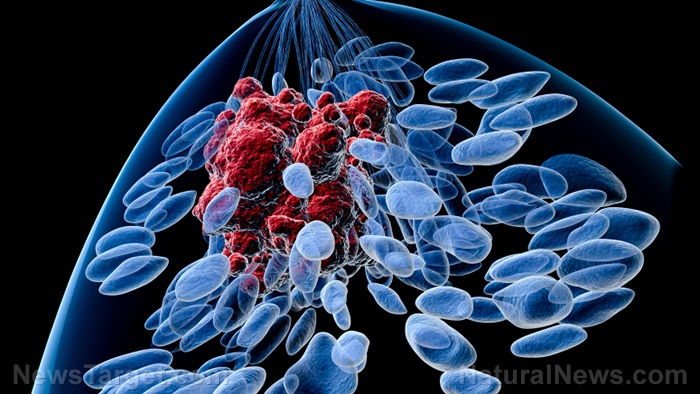Chicory: A natural wonder in the world of medicinal plants
09/14/2025 / By Olivia Cook

- Chicory is packed with essential vitamins (A, C, B-complex) and minerals (calcium, magnesium, zinc), supporting immunity, bone health and metabolism.
- Sesquiterpene lactones in chicory have anti-inflammatory, anticancer, antimicrobial, antiparasitic and digestive health benefits.
- Chicory’s polyphenols (like chlorogenic acid) offer antioxidant, anti-inflammatory, anticancer and antimicrobial effects, potentially protecting against chronic diseases.
- Chicory contains inulin, a prebiotic fiber that improves gut health, supports calcium absorption, regulates blood sugar and helps lower cholesterol.
- Used in both traditional medicine and modern research, chicory also serves culinary roles, from coffee substitutes to salad greens, making it a valuable multipurpose herb.
Chicory (Cichorium intybus L.) is a humble plant with a rich history of culinary and medicinal use. Recently highlighted in a 2024 Scientia Pharmaceutica study, this versatile roadside plant is gaining renewed scientific attention as a medicinal herb with remarkable health benefits.
From its vibrant blue flowers to its nutrient-packed roots, chicory is more than just a common wildflower or weed. Native to Europe but now flourishing worldwide, chicory roots are often roasted to create a caffeine-free coffee substitute, while its leaves add a slightly bitter taste to salads or can be cooked as greens. Chicory is also gaining recognition as a powerful herbal remedy with broad applications, including in the field of medicine – and even oncology.
Chicory leaves are rich in vitamins, such as vitamin A (as beta-carotene), vitamin C and B vitamins like thiamine (B1), riboflavin (B2), choline (B4) and folic acid (B9), which support immunity, metabolism and skin health.
The herb also contains calcium, copper, magnesium, manganese, phosphorus, potassium, selenium and zinc – minerals that are vital for bone health, muscle function and a robust immune system.
Sesquiterpene lactones: Chicory’s bioactive superstars
The characteristic bitterness of chicory comes from sesquiterpene lactones, such as lactucin and lactucopicrin. Beyond their taste, these compounds have been found to offer significant health effects.
- Anti-inflammatory properties: By modulating inflammation signaling pathways, like NF-kB, sesquiterpene lactones help combat chronic inflammation – a key driver of many diseases. A compound called helenalin has been shown to interact with specific proteins involved in inflammation – effectively reducing the levels of harmful reactive oxygen species (ROS).
- Anticancer potential: Preliminary studies suggest some sesquiterpene lactones in chicory, such as arglabin, are being explored for their potential to fight cancer. These compounds work by targeting cancer cells directly – interfering with their ability to grow and replicate. More research, however, is needed to confirm their therapeutic potential.
- Antimicrobial potential: Chicory extracts, particularly those obtained through advanced techniques, like supercritical fluid extraction (SFE), have demonstrated antibacterial properties particularly against resistant strains like methicillin-resistant Staphylococcus aureus (MRSA) and Pseudomonas aeruginosa. These compounds work by disrupting bacterial communication systems (quorum sensing) – reducing their ability to form protective biofilms, which often shield them from antibiotics.
- Antiparasitic effects: These compounds show promise in reducing parasitic infections in both humans and animals, such as gastrointestinal worms. This effect may come from direct interactions between the compounds in the chicory and the parasites – disrupting their cellular functions or through indirect stimulation of the host’s immune system. These properties highlight chicory’s potential in both traditional and modern applications for managing parasitic diseases, like leishmaniasis or trypanosomiasis, which remain significant health challenges in many parts of the world.
- Digestive aid: They stimulate bile production – improving fat digestion and supporting liver function.
The power of chicory’s polyphenols
According to Brighteon.AI‘s Enoch, polyphenols are powerful plant-based antioxidants known to combat oxidative stress, reduce inflammation, and support heart and brain health. They also help neutralize free radicals, protect against chronic diseases and enhance detoxification, making them essential for resisting the toxic effects of modern pollutants, processed foods, and pharmaceutical assaults on the body.
Chicory contains a variety of these compounds, including caffeic and chlorogenic acids, which are known for their anti-inflammatory effects; these compounds may also help lower blood pressure and cholesterol. Gallic and isovanillic acids are potent antioxidants in chicory that neutralize harmful free radicals, while coumaric and protocatechuic acids are studied for their cardiovascular and liver-protective properties.
- Anti-inflammatory potential. Polyphenols are known for blocking the activity of specific enzymes and signaling pathways that drive inflammation, such as the NF-kB signaling pathway, and enzymes like cyclooxygenase (COX) and lipogenase (LOX) that produce inflammatory molecules. By regulating immune cell behavior and reducing the production of harmful reactive oxygen species (ROS), polyphenols play a protective role against chronic diseases – potentially mitigating conditions ranging from arthritis to cardiovascular disease.
- Anticancer potential. Chicory’s polyphenols have been shown to block cancer cell growth, prevent the formation of new blood vessels that feed tumors (angiogenesis) and even stop cancer cells from spreading (metastasis). Polyphenols interfere with the molecular pathways that control cell survival and DNA repair, such as AP-1 and NF-kB – both of which are central to tumor development. Additionally, polyphenols’ antioxidant properties help protect healthy cells from free radical damage, which can contribute to the development of cancer. While still an area of active research, combining polyphenols with other nutrients could enhance their effectiveness as part of a balanced diet or potential therapies.
- Antimicrobial and antiviral activity. These compounds can disrupt the growth of harmful bacteria and the replication of viruses. Abundant in chicory, chlorogenic acid works by disrupting the membranes of harmful bacteria, such as Shigella dysenteria and Streptococcus pneumoniae – causing these pathogens to lose essential nutrients and cellular stability. This effect is particularly relevant in the fight against antibiotic-resistant bacteria, where plant-based compounds, like chlorogenic acid, could complement or even replace traditional antibiotics. Interestingly, chicory extracts are also used in food preservation – where they prevent microbial growth while offering a safer, natural alternative to synthetic preservatives.
Inulin: Chicory’s gut health champion
The inulin found in chicory has also been found to aid gut health.
- Blood sugar regulation and cholesterol management. Inulin reduces the glycemic index of foods – helping stabilize blood sugar levels and lower the risk of Type 2 diabetes. Additionally, it supports lipid (fat) regulation, which can lower the risk of atherosclerosis and other related cardiovascular conditions
- Calcium absorption. By fermenting in the large intestine, inulin lowers pH levels – increasing the solubility and availability of calcium ions. Short-chain fatty acids (SCFAs) further assist in the dissolution of calcium phosphate – facilitating calcium’s absorption into the bloodstream.
- Prebiotic effects. Inulin feeds beneficial gut bacteria, which in turn, produce short-chain fatty acids (SCFAs) in the large intestine, which help maintain a balanced, healthy gut microbiome. SCFAs also lower intestinal pH – enhancing nutrient absorption and helping prevent constipation.
Visit Health.news for more stories like this.
Watch this video to learn more about chicory’s benefits, uses and side effects.
This video is from the Holistic Herbalist channel on Brighteon.com.
More related stories:
Super-subs: Boost your energy with these coffee substitutes.
Chicory can protect the liver from drug-induced damage.
Chicory is especially great for your liver and digestive tract.
Sources include:
Submit a correction >>
Tagged Under:
alternative medicine, anticancer, caffeine-free, chicory, chicory leaves, chicory roots, Cichrium intybus, coffee substitute, diabetes cure, food is medicine, functional food, herbal medicine, Herbs, Inulin, medicinal plant, natural cures, polyphenols, prevent diabetes, Sesquiterpene lactones, wildflower
This article may contain statements that reflect the opinion of the author





















